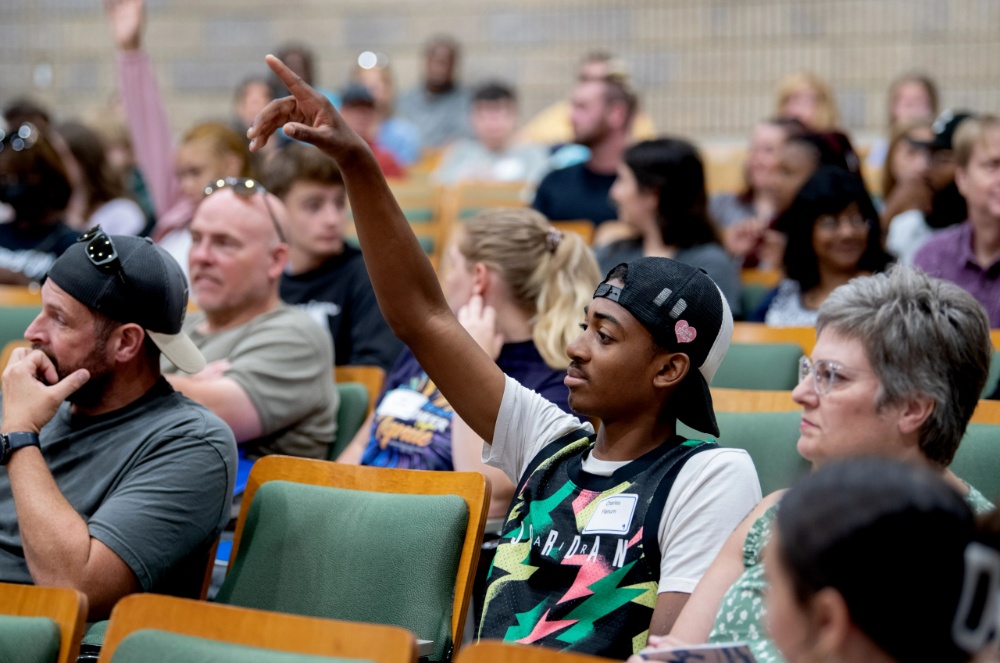News
Democratic classroom emphasizes coming to voice
October 05, 2022

In a philosophical exchange with the clergyman Richard Price, Thomas Jefferson wrote, “wherever the people are well informed they can be trusted with their own government; that whenever things get so far wrong as to attract their notice, they may be relied on to set them to rights” (1789). The draftsmen of the Declaration of Independence and the U.S. Constitution recognized that an informed citizenry is foundational for a form of government in which the people elect leaders to represent them and carry out their will. Without responsible and responsive citizens, a deliberative democracy deteriorates into rule by those with the loudest voices, biggest sticks, and deepest pockets. This is a criticism that our current political system faces today, and it is one that must be reckoned with if America has any hope of sustaining rule by the people.
This is where the classroom plays a vital role. Classrooms devoted to higher learning can and should serve as practice arenas for deliberative democracy, in which ideas are presented for common review and debated upon merit, criticism exchanged civilly, and consensus and dissent are documented. Many students entering the college classroom find themselves asked to speak and participate in ways perhaps not expected of them in high school. It is where they test out their ideas in specific contexts and can receive feedback from both peers and people respected in their disciplines. As bell hooks would say, the democratic classroom emphasizes “coming to voice.”
I frequently teach all first-year sections of Integrative Studies 100, a general education requirement that introduces students to individual and collective ethics through works of philosophy and literature. Most enter having a vague understanding of social ethics, that we should be kind and generous to others, but are still discovering that we have obligations to our communities that require us to practice responsible citizenship. Being informed and knowing how to use knowledge responsibly are not coincidentally foundational principles of both a liberal education and a democracy. The content and the skills students learn in the classroom must be applicable in their civic as well as professional lives.
As an educator, I see my responsibility as twofold: Teach the curriculum and empower students to take an active role in their education. Regardless of the subject taught, students should feel ownership of both the content and their learning it. In my sections of INT 100, students are given coursework that requires them to research information about the election process by reporting information about local governance, ballot initiatives, and voting rules and responsibilities. Students are offered credit for attending voter education events on campus and are given class time to raise and discuss the issues about which they are concerned. Through this work, students both exercise their ideas and are given information about how to direct those ideas into action through the democratic process.
Prior to being hired as affiliate faculty in the Integrative, Religious, and Intercultural Studies Department, I worked as an elections administrator, including the 2020 election cycle. The dissemination of misinformation and the degradation of civil exchange does not need to be rehashed here but suffice it to say that distrust and disregard threaten our fragile democracy. My first-hand experience working as a clerk is that the citizenry is not sufficiently knowledgeable about how the election process works and what each person must do to support it. What is needed are informed citizens “that whenever things get so far wrong as to attract their notice, they may be relied on to set them to rights.” I want to highlight Jefferson’s use of the phrase “relied upon.” A democracy relies upon the citizen to be informed, to value their own voice, to be humble when encountering the lived experiences of others, to exercise their right to choose leadership and hold that leadership accountable. These are responsibilities that should likewise be learned and practiced in every classroom.
By:Dan Cope (Affiliate Faculty-The Integrative, Religious, and Intercultural Studies Department)
